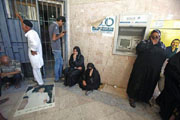VOA标准英语2011--Libya Faces Economic Challenges in Post-Gadhafi Era
搜索关注在线英语听力室公众号:tingroom,领取免费英语资料大礼包。
(单词翻译)
Libya Faces Economic Challenges in Post-Gadhafi Era
Moammar Gadhafi is dead, but Libyans still face many difficulties now that their long time leader is gone, including how to repair a battered1 economy.
Before the uprisings, Libya produced roughly 1.6 million barrels of light, sweet crude oil per day. Today, the country's oil production is barely one fourth of that.
And yet, despite the country's historic dependence2 on oil exports, Middle East expert Anthony Cordesman said oil is not the key to Libya's future.
"There's a debate over how long it will take to bring its existing production on line, whether it can go back to what it was producing before this started; in a matter of months? A year? A year and a half? But no matter what happens, that doesn't bring national wealth," said Cordesman. "It has to create an economic structure that has many other ways of providing money, or its people are not going to have the stability, the careers, the income they want."
With nearly one in three Libyans out of work and a poverty rate above 30 percent, Cordesman said what the country needs most is cash. Cordesman said some of that will come from unlocking billions of dollars Gadhafi stashed3 away during his 42-year reign4.
 |
| Libyans waits outside a branch of the North Africa Bank to get 250 Libyan dinars ($200) at the Souk al-Djoumaa district in Tripoli, Libya, August 2011. (file photo) |
"At this point in time, Libya can draw on the fact that Gadhafi built up a vast amount of international reserves. Many of them are not liquid. It does not have the capability5 or the governance to spend the money quickly and wisely, and that amount of money will go very quickly if it's wasted simply on empty jobs and big projects that don't produce any real development," he said.
The U.S. government has promised about $40 million to help Libya secure and destroy its dangerous weapons stockpiles. But aside from playing a guiding role in Libya's transition to democracy, Cordesman said there's little the U.S. can or should do in Libya.
"We need to be very careful to help the Libyans help themselves as much as we can. We don't want instability in North Africa, we don't want an oil power to be permanently6 tied up in internal conflict, we don't want Islamic extremism to take over, but we really have to be honest about our own capabilities7 and particularly our own politics now."
Officials from the World Bank and International Monetary8 Fund say they are working to help Libya assess its battered economy and improve its public finances. The IMF announced recognition last month for Libya's transitional government, paving the way for future financial assistance.
 收听单词发音
收听单词发音 




